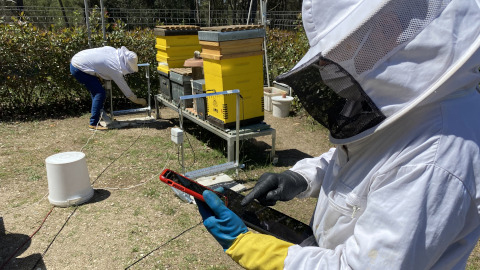The role of the Asian hornet in the decline of bees is confirmed
After two years of collecting data in peri-urban conditions, the UABee project confirms that the Asian wasp poses a major threat to the survival of bees, but shows that it is possible to prevent the decline with proper hive management.

A team of researchers from the UAB has carried out a two-year follow-up, between March 2019 and February 2021, of the UABee experimental apiary, initially made up of six hives populated with Iberian bees (the native Spanish race Apis mellifera iberiensis). It is the first fully monitored apiary in Spain that is being followed both by manual methods and by sensors. The apiary applies reference health conditions (mandatory treatments against the varroa mite in the absence of breeding) and support measures in critical periods. The researchers have recorded the weight, the incidences that occurred in the hives, they have captured images of the activity of the bees and they have related all this to the weather conditions. The study has been completed with the analysis of the pollen and the origin of the nectar used to produce the honey.
The data show that the weight of the hives and the activity of the bees in peri-urban Mediterranean conditions (the apiary is located in a forest area on the same UAB campus in Bellaterra) increases with the temperature in winter and spring, but decreases markedly in summer and after honey harvests, with minimums in early autumn. Because of this, researchers recommend beekeepers harvest early in the spring to allow bees to build up their honey and pollen reserves to get them through the summer and winter.
The study also shows how foraging activity, the behavior of worker bees that collect pollen and nectar, depends on temperature, with a maximum of activity at 19.4°C, and decreasing greatly if the temperature drops below 7°C or rises above 31°C. Thus, even if there is flowering, its usefulness for Iberian bees is very limited in winter and summer.
The mortality of hives protected against the varroa mite was 17% per year (1 out of every 6 hives), below the Spanish average, and attacks by velutine wasps, the Asian wasp, constituted the greatest threat among the months of June and November. The Asian hornet restricts the bees' exit throughout the day and was responsible for a third of the total hive losses, so electric claws were installed as protection, killing more than 4 velutines per day, although with collateral effects on the bees themselves and on other species. The researchers estimate that the installation of claws prevented the predation of more than 14,000 bees in 2020. With these measures, the average honey production was 13 kg per hive per year, located between the Spanish average (10 kg ) and the European (15 kg).
"Thanks to the monitoring with weight, temperature and sound sensors, it has been possible to identify the hives that had problems or those in which the bees were leaving, recovering the swarms in order to strengthen them and keep them active". explains the project director, Gerardo Caja. "Everything indicates that in Spain and Europe the decline of domestic bees is being slowed down, and our work shows that with good management and control of the new Asian wasp plague, the population and the production of the hives could be maintained", he adds the professor of the Department of Animal Science and Food at the UAB.
New phase of the UABee project
The UABee project was started in May 2019 with the aim of building an experimental apiary for demonstration (visits to get in touch with beekeeping and bee biology), teaching (training courses for university students and professionals in the sector) and research on beekeeping and bee biology. It is a unique experimental apiary in Catalonia, and with the second phase of electronic monitoring now starting, it becomes the only completely monitored apiary in all of Spain, which will allow more detailed studies in the future. Consisting initially of six hives intended to accommodate standard colonies and with the possibility of modifying their configuration according to the activity and size of the colony, the installation has recently been expanded to ten hives.
UABee will also host research projects in collaboration with other institutions, aimed at the study of bee metabolomics, the chemical processes that take place inside the cells of its organism. The company Granja San Francisco participates as a founder in the project and is open to collaboration with other companies related to the food, veterinary and social sectors.